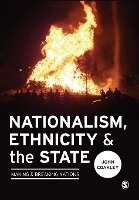This exciting new book is the first to offer a truly comprehensive account of the vibrant topic of nationalism.
Packed with a series of rich, illustrative examples, the book examines this powerful and remarkable political force by exploring:
- Definitions of nationalism
- Language and nationalism
- Religion and Nationalism
- Nationalist history
- The social roots of ideologies and the significance of race, gender and class
- Nationalist movements, from dominant majorities to peripheral minorities socio-economic and sociological perspectives
- State responses to nationalism
Supported by a number of helpful illustrations, tables and diagrams, the text is both engaging and highly informative.
Nationalism, Ethnicity and the State: Making and Breaking Nations will prove an insightful read for both undergraduate and postgraduate students and researchers in the area of Politics and International Relations.

